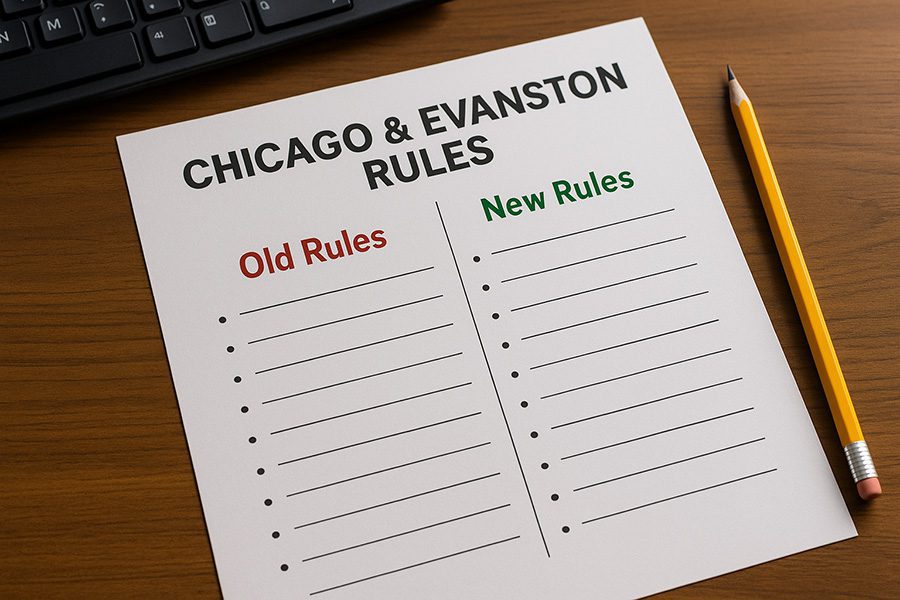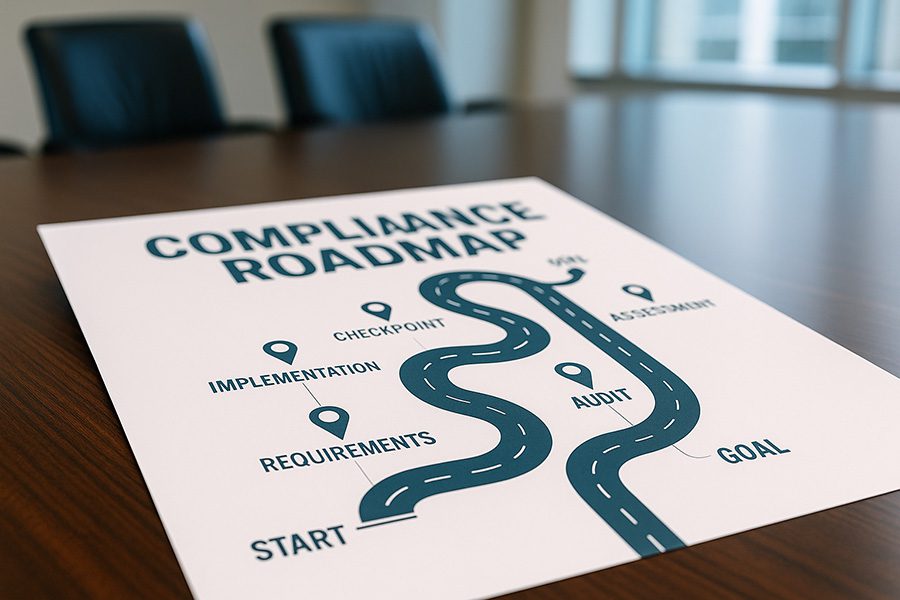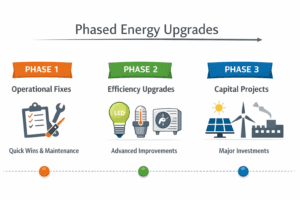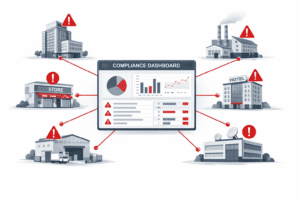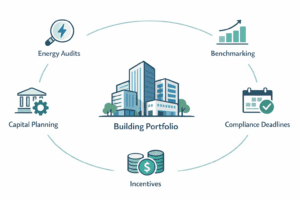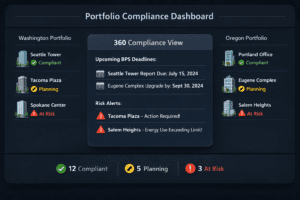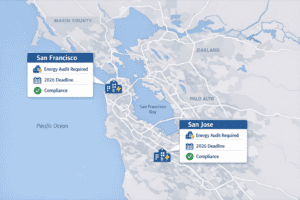Chicago & Evanston 2026 Benchmark Rules: Preparing Now
Energy benchmarking in Chicago and Evanston is shifting into high gear, with new reporting rules and $1,000 fines set for 2026. Building owners who prepare now will avoid penalties, ensure accurate ENERGY STAR reporting, and take advantage of early-filing benefits.
Why 2026 Is A Pivotal Year For Benchmarking In Illinois
Chicago and Evanston have decided to double down on building energy transparency for 2026.
Compliance requirements in both cities are becoming more structured and penalties more predictable.
Chicago has enforced benchmarking since 2014, while Evanston adopted its own ordinance in 2016. Both require ENERGY STAR Portfolio Manager data to be submitted annually, but beginning in 2026, both programs highlight stricter data verification and emphasize fines for late or inaccurate reporting, up to $1,000 per property.
With deadlines converging, owners must manage compliance for both cities at once.
Chicago Benchmarking Rules 2026: What’s New
Chicago’s program already applies to commercial, municipal, and residential buildings over 50,000 square feet.
The big change in 2026? How compliance will be enforced.
Annual ENERGY STAR reports must include third-party data verification every three years, ensuring accuracy of utility inputs and building characteristics. Failure to comply can result in a $100–$200 fine per day, capped at $1,000 annually.
More importantly, late filers risk reputational impact, Chicago publicly discloses compliance status, which can affect tenant and investor confidence.
While Chicago focuses on transparency through disclosure, Evanston’s approach emphasizes deadlines and financial penalties.
Evanston’s Energy Reporting Law 2026

Evanston’s ordinance is modeled on Chicago’s but tailored for local building stock.
Many owners assume compliance in Chicago covers them in Evanston. That’s not accurate.
Evanston requires large commercial and multifamily properties (20,000 square feet or more) to submit annual energy performance data. As in Chicago, ENERGY STAR Portfolio Manager is the required platform, and data verification by a licensed professional is mandated every three years. Late or missing reports trigger fines, with a maximum penalty of $1,000 per property, per year. For portfolio owners, this means doubling exposure if they own assets in both cities.
Managing two reporting areas requires careful planning and that’s where early filing becomes strategic.
The Benefits of Filing Early
Filing before the deadline isn’t just about peace of mind, it can save money and reduce risk.
Many owners wait until the last minute, increasing the chance of errors.
Early filing allows time for utility data correction, cross-checking ENERGY STAR scores, and securing third-party verification without rushing. Both Chicago and Evanston accept early submissions, and completing the process ahead of schedule eliminates the risk of rolling into daily fines. Early compliance also frees management teams to focus on operations instead of scrambling against regulatory calendars.
Of course, early filing only works if the data itself is accurate, which makes verification critical.
Why Data Verification Matters
ENERGY STAR scores are only as reliable as the data you enter.
Both Chicago and Evanston require professional verification every three years, but even in off-years, ensuring accuracy prevents costly mistakes. Incorrect square footage, occupancy data, or utility entries can flag your report as noncompliant—even if submitted on time. A verified report builds confidence not just with regulators, but also with tenants and investors who increasingly use ENERGY STAR scores to evaluate building performance.
With penalties capped at $1,000, some owners may view non-compliance as “affordable.” The reality is risk extends far beyond fines.
The Real Cost of Non-Compliance
The $1,000 maximum fine may look manageable, but it’s only part of the equation.
Owners who dismiss benchmarking rules end up underestimating the costs.
Chicago publicly lists non-compliant buildings, creating reputational risk. Non-compliance also complicates financing, as lenders and investors increasingly require proof of sustainable operations. In Evanston, repeat violations can escalate enforcement measures, making non-compliance a persistent liability rather than a one-time cost.
Instead of paying penalties, owners should adopt a compliance roadmap that works across both cities.
Your Compliance Roadmap for 2026
To stay ahead of the rules in both Chicago and Evanston, follow this four-step plan:
1: Audit your building portfolio:
Identify which assets fall under each city’s threshold and reporting requirements.
2: Standardize your ENERGY STAR process:
Use one consistent method to collect utility data, calculate scores, and verify accuracy across properties.
3: Schedule third-party verification early:
Don’t wait until the triennial requirement—get ahead by booking engineers or energy professionals months before the deadline.
4: File early in both cities:
Take advantage of early submission windows to prevent errors, delays, and fines.
This approach ensures compliance while reducing stress and operational disruption.
With a plan in place, the last step is knowing where to get expert help.
Why Work with Compliance Specialists
Benchmarking may seem straightforward, but filing across two cities reveals hidden complexity.
Owners who try to manage filings internally often overlook nuances.
Specialists understand the fine structures, verification requirements, and submission portals for both Chicago and Evanston. They streamline data collection, handle cross-checking, and submit verified reports on your behalf, ensuring accuracy and preventing penalties. For owners with buildings in both cities, consulting support consolidates tasks, saving time and money.
With 2026 approaching, the choice is clear, prepare now or risk compliance failures later.
Final Thought: Prepare Early, File Accurately
Chicago and Evanston’s 2026 benchmarking rules are clear: accurate ENERGY STAR data, timely reporting, and $1,000 maximum fines for non-compliance. But the real advantage isn’t just avoiding penalties—it’s protecting asset value, reputation, and access to capital.
Start early, verify your data, and streamline compliance across both cities. The sooner you act, the easier it becomes to stay ahead of Illinois’ evolving energy laws.
Want To File with Confidence?
Avoid Chicago and Evanston benchmark fines, start early. The max fine is $1,000 and you can prevent it by submitting your report AHEAD of schedule.
See how 8,000+ property owners prevent penalties and protect their properties by, ⬇️


